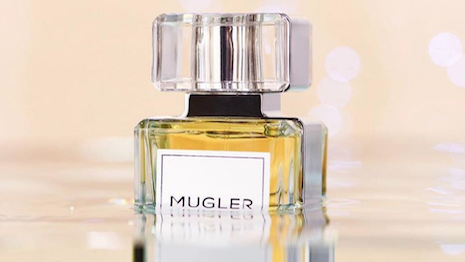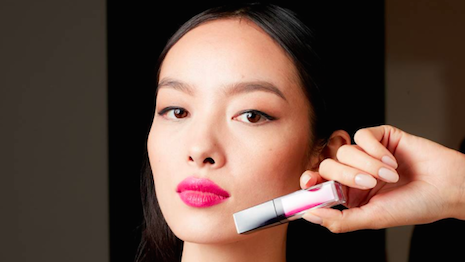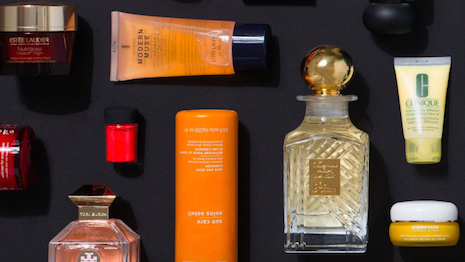Global color cosmetics sales are up 6 percent from 2017, reaching a total of $48.3 billion in 2018.
This data comes from a report by Mintel, which identified four areas of growth for the cosmetics industry at large. While the United States and the United Kingdom remain top markets, China and Japan have also shot up into the top spots.
“The success of influencers has shown that people buy the personality, and not simply the products," said Charlotte Libby, global color cosmetics analyst at Mintel, London. "It has become more important for brands to have a personality, to showcase their founders and tell their story to be relatable for consumers.
"Social media gives brands a way to give customers behind-the-scenes access to their culture."
Global beauty growth
The global cosmetics industry has been on a healthy growth trend through the last few years.
According Mintel's report, that growth has now translated into more than $48 billion in revenue across the world.
The major markets are the U.S., Japan, China, the U.K. and South Korea, which together will drive the most revenue.

Global beauty sales are up to $48 billion. Image credit: Mugler
Part of the reason for the growth comes from the Internet and influencers. For example, 41 percent of Chinese cosmetics users say they are influenced by bloggers, influencers and celebrities.
Similarly, 66 percent of U.K. beauty consumers aged 18 to 24 say they frequently look to influencers to learn new makeup techniques.
Another notable trend is that users increasingly want brands to be transparent and ethical.
Thirty-four percent of Brazilian beauty users prefer brands that support social causes, but users are also wary of false charity. Thirty-nine percent of US beauty consumers believe that brands donate to charity solely to make themselves look better.
Sustainability concerns
The question of sustainability and ethics has put the cosmetics industry in a tight spot on some ethical questions.
While Western consumers tend to reject beauty products tested on animals, China still requires such trials, putting luxury beauty brands in an awkward position.
A report from Perfect 365 found that a significant portion of Western consumers condemn the testing of beauty products on animals and will reject brands that do so. As China increasingly becomes a major center of luxury consumption, on its way to being the largest market for beauty products in the world, brands have a tough choice ahead of them (see story).
Some fragrance makers have put sustainability at the forefront of their growth strategies. French fashion house Mugler is looking to become a sustainable pioneer in the fragrance space by using responsibly developed alcohol in its perfumes.

China is becoming a massive market for luxury beauty products. Image credit: Estée Lauder
Nearly all facets of the luxury industry are pushing environmentally friendly agendas as consumer consciousness gravitates toward an interest in ethical and sustainable business practice and products. Parfums Mugler, produced by the Clarins Group, is striving to become the fragrance sector’s first brand to take steps to manufacturing a more responsible product (see story).
“As consumer demand for makeup with skincare benefits increases, there is more opportunity for brands to develop hybridization between categories," Ms. Libby said. "As part of growing concerns around pollution, face makeup can act as another layer of protection.
"Hence, it is important that color cosmetics incorporate skincare benefits such as hydration and UV protection," she said. "Probiotics also have a chance to grow; a prominent trend in skincare, connecting good bacteria to healthy skin, they are increasingly being used in color cosmetics, too.”
{"ct":"dtCexdsC6tRauIjImOcm5uILkV+syeF\/QPFn2WoIJWG4dZA99ywN69s5cNV4IbOfC2JEZeEz2Icwi4EQWHQx7\/odLjOXPyBfa1zWbLhkC7CrxHGb69qd08Qd3kmivmiJKdwIdN8a7qjig2K3PAiSG62lmyEx++SXjEqFIUxii\/nQ9EUPHEIm+gmQWrcXgPYDxYc3fj8Iq+RSgBWbIAVs3ajXq+tTAvgzEwmrRFo\/mV3hFLOyqV2K+dWba6CaZQp5ok4P5Md671zR951yDjz+AjlKuXbaVwbC4veS7yKGMcHh+0MrvCP\/mYn\/u0KFlpOt4G5lefEdWdgC9kof1F\/kUqz8RzPbSJNmljTCNTNrciQaiyecU9Of44Dn3iiecctmLNB4dwKWTMZk1jyAsSc4wjZt57HB286WR7V7rBsXKbAbFqdew0lbATNCtzeiRzCLgYC3wOZq5Yj7wZL72lypEMbM3SFN\/Ioeq98BLho8+m\/MeXml3tMRtbySgLTOxD4Eaxb9D5mn9IfouUbyhE1YeL\/CuHYHdz\/PdRF4erAXAhevSJ0srxNCozArGhYikeBShv2jDv1xG2SxC0bdndPwF205nAGQePPKPgvEO42N\/oZtvrAVhyuoAlzrrhW8TL+TuQWWnjgZGKNOXEAglU70WEeUl+ZURZpdeFfzT89lG+BsGn+s5hu65JCyPaPi0rafloo31pSypex\/PjU1szs5fdcJatWlRooewrfDFMoWnuSOhA9\/bjTKOfYyuWfRwZnUXU4LIPOESOjI4aKtHxNI2Nyh\/w7ITrbpc5meT8\/rRD2i6cz6nE05Zl1jp48lubn9JNNpF1nCwvfktXqY7NM\/ei2DHsQGjKECpn8CIsXioVOiZCl\/IcvRaGJXeXBwGsB6EPtURIYHTcmr8DWvlhS5UU2QKoThE76PBx4VG6Ygao7vMtaEggT4pXoPpiytEXVJQUCetgRqxb47DxLvZJnDVad5ooQ4BbSvRNYjSE2xdKNwqCeucvelcttBb6IhdsVg+9Z18INon1dZirsLJPoxXpRb3L001lzNBWTzKhEWx8h7NYvpAOc4aLasLoTwX3b+NLxId5y2c9y4hHGNl4wXqCwJsVUztdbik\/T6YRes4H7vxTPK6kTzOLSXDTb3YKZ+T20kQR6vtv6HN01HlOjOxF7cqKaqZJuhUOiw4v+fQjI14tMAxd6Btj7Dz5HIlKZSqe12T2pCjcnZxnLOhVA1YK\/nZzIJ2RBMvH8fm4G16W1+wCVaV+dXS7N4hCTIPQvJ3lsTejEl3EUjYy984ujxccTGO6ZWk14rF+hqJgI5jbs39GktGixG6o9\/yA+NlKPPqq4Kl921Cl3aKvixgfqPZwvR\/CrjFGmZKZVLts5Hp0x4\/a\/MGWO2L2AmPJSQI+N\/eAQdn6Ls4anIKKls7N4umYBVYs0sgRrnfOG5SWH\/lG9jv7bAOg1V28dXCkSEDpd7ABIe9hgcdirvsu\/aMwJL8sSdLg2lb7u\/MsgxHeJSW8VvUtOgX7cRa2OkjWzWzTS9Xg01940urdoFkvFeHkW9dB81X1wl+ZhWtimhvGhPliya1B4Wsm5ZbjUyrEcX1g8LSw7QcWAatovy0ryFcVWdQOgfvXsP1NAVGJdIrXX0thVNBJUt+I9Pq9oD4QwR5H8v8h+gn6bt\/2T74rSArvREffMRddzqnf5MdUDZ5mpAz18AB8DAEHdTMdg1+fGRlP6XlbTsMpNe\/z0SMbEGGhAsf5hHy8qy8QLqg7IpUc\/yNL6bra5Ha7AbVcyupqr3dTRNbO+r5I1KX936manEOhSES+tNaM0K6xDZnXLVolP31BpMKJCqgVgSrc6\/\/xcFRWg80D9+LO6I2Eb1kCZvf6bmMYghKqRvpy3oS7Gk\/z9w32yVxhXEmjEYyYmEkRqzLX2oP5AwuFnyOGkkCMb31oncPizG9bYUquo2IL7r9IWmYKaw98kgm9wynGq0SNxvnkBTxUAYIwJ5J05LiAflf8L+aP15629J2MJDFlQcljzHk3EPI\/PhiaNr3FJ0cSBObIbi3pkHebGgyes\/DQTVWUyDj5zwitXMg6a7jSUWqbXcM14s5E3WJLD2rdm\/Gb7C6fcqEje+wQi0RfP6PyiE6eCcT3GhL6fyPQNSaA7W2XWGusDAJutCcA0e55Dk5MusljcSaWBoAV8mNSJuR3LuKdRl9ZO74JN\/owAefsTHoxmk9yNgzkV1g+zwpGNmstEixMYySY8w8q\/CslEw\/+81YtnzUGPlHnMjDIOsdR+Io12ID1z1TN\/eH8EOK8r7vmbzZ8OYt4f1O2siZvQT6wyiQDWLMZh+MESmTHpr6ssCAfs6\/XkYBSGoTX0PL+fk5ypB3MGsLo3qKMvwnvO9nioxVmEoUZLYZiD6ymmqWCoAehuPgUM2oB4SGeZ\/PJTAPu7bEveY7BxUEBDsXuCRBoMAnpAcx3KUvwLSWouf21SM+mMlpQrgeUmP3F1DWjfcePn6fyElMCU7p25I4FhEYL+tEZmwkUQhq9umV0njiL6TNx4UjpPPj2TnX8o7iRrYmAe47hb2aJ8ZQFAxpMg4\/ATA+l5c9hZZoWED\/svDTpl6oaSWX1swpP+4qiSt+A85GnVXfald3OJrvqL5z80lNz2UE65OWeQW7JV4IOcj3H916P1EYUAVE69TU3QRpN0VocSBcyv6VT0gPKppOF6Ev6FLle4\/hQn\/gPRYVEks0GTtWuf323if9xSCj7k1eEI0VcRnnrycoxbjqP3Jd2POiCRd4yoPfjky\/bZEhRwQWN8JPWNzRD8vXyigaw936Ehl4KPAYaQc7eoGnygKOc+wTa494SkeYzduks5enLW+l712NyR4AnUnADEBN58Y4f8LjrpbiWgrIt7y7gLVbATs31HV2ouZyynSzaoMEGxNRJg5UK72H+unKKokTdMD6bUjQeEBtCUvYR7zeT7oJi1nTtmPEhDQRJgXSp3MxhL9rbtss\/5JLbsBoZXCDKa6QE++IkZNZYwqLVMnOEWSwpxTJpxdk8YZjsv0ejvtlAZXdN+wQxDxqpnodVOzvar9tSLMfFx3rH+hKpCOSToMrBI3iJfjV0TYOaTlJM2S7JyfMuYxDlIYOhF\/e92e4+8mnFYsmVGwJ7L6rpanrYn1NxptX+afJwph0KoyxVEsFCAH7eqtQMZCBMM\/bqGM\/j+GSxByjlTPrCUfNv9Lxp3oHjutv\/DZKSuJO\/vyH6pIswclOG+BKFaQotfdgZxdt\/MWJIuwyIcee19Szq59VuQ9XczIPxNvg+AwDTD52av\/iiJSJ4ifDf8l3CNcu6Esri3A+7QYsH9IKfC+jYALo3+twkYKw2eRAmL+YYoTqgn7T6+cjXoVY3qRduCOLtp3iQn\/VuV0GgINecxaOVuIpqNqKDqexKLWJ7Ws1cluBdkU9tdGMf4QmSzne9rCxqSv\/RR\/qysRLGpiuC8f8TXX0+jy4xuvc8NfDMiyRyTcFD\/GFsrI++imJ4i4KRyRo4PeH+ZIy8gHUGof\/RB63M89sf+Sm6XqNXCntKYdtagudV5oE8QQ29wJ\/1AezMHxv6mLJvEVUhp4MwH16zgiL9Rkb9t0NAaAWSNsf8EDT1jjsKw0p3ul5qDvvnnhlroTxChnYmqlwC9rQh9kUCnIZiyCYnrCGCvJVX7PWRsy+osT9Mx2lKvu4wEWCYJzN4GDF0IUmgM8u8xphyWsJbKBhUCenZJ+2k7tChV8wN59s4LF21UPxr4a6urSQFgF4dczBLWNVA6Id6PynaU0UoCwCjxXRWzWO6hsVpHHuAa+YxTWfGQok4lkTPxGMf54ABXOAibi+D2QfQ8cCvYUAblv5G1kF9bGwn8j5resPOxFaUT4UZeR49ow9XCMe\/\/AqQ7N4qniV6B18aRGX+FOnwGmO6P3\/\/8cVJoaXjWZlVG7uL8HY2ICFfq6DVEGe3TH\/DME4+\/P4MnubkozhHD\/p12LXq+26a0VuQ96FDSYCT45eevoZ2mxi3Y0ZL349Ax+awMx5Y+fGTDW7WVHKIja2JGxmK87zumYtGSVVhY3uwMG+WZA7QBJGaq7\/ToC8NgZ1iNbKvhLSsChk3FZSBDy4fznzBKKNqxaq3Wl1dqEPujW9DLfq3uw7Bp8s4qvYesPX1ZbyZ\/gkSHCSoEzvaFHVVYJWN25XyX5WkbjlGFjTnPGCkhnUf3mr+MDWT5TsupvXj1Xh6ut4qVSbOMdrU6nKL2SFkX5WFqts10qEG0W2IvdT7iI9pgKOd19jskE7n7\/sy04uaagLNb9TVE3lx9B0Hz2EJOjrjae+nsMU1+CK+IC3qpI1RRi8RiRLYxjJ0DOE9SHBmSBU6eAkpudjSUBx0XPZgXa6iXcOke5sqf0qPeW8OHRqjXE+ivsUMox6huQunPpwPW\/o5T6btFFHt89NkpUI8U8bLtnWDk0TzjfR99WD6\/rFMYejVSQo5SgIw4CG\/R1Zq47npU4SfrEfbM7oI9BvT2e3KyIIW9LqP6zqnEdI6CiXWe5USPGeH+\/UrEt7NpB0qVfsTZ1eIB28Oelm6p+ogCzt58mnNMSLpIRANDqWBaowc+j76VAN2XrbsTSXKE7B1c1D63oS1ZjEJ6acdmFMoqr2I6Wxpz3yK5wH3isF+FeNJ12m9+KyA6eJfq740fpz3D1y8p+bE9b+4DrqBQh+X4Z9xRui0AECN0\/6Kfl9z3\/DeIzeULR7JR2012jbGMT4RPv4QliuPyQqQqt3wGziSTJvDdnHt1HBnIIgfganBWlhTIJmNeJq+scseaO8pQaiYF1Al69QfLPdtmwIkWybgjI3p7Ce49L4o9g3Lh1fPEo1xsV94C5wOLJBufqlG950d5lidgCitgNtshZWh+cGyEzQAPY5Pi4PtwhzcLg+EgpRsbwQZhdCoVSvaF5XH\/zJ8zbONreFS\/R26BPc542NYgbK1Y\/AO3NPiEqyOQ+0z9aroVHAFLAt8w3+D9gU0csNDycPRa3aUwqDk6iy5ymYZHXujvMBdsLUmrXzkZMxFFkN4e\/Y7bsxhVXwUV58UN6WS3mNDDuyZVAyh938O+WtmRPAlMmSfnKNzuFDukw+YsbYFHCIQ8KMzzHNIuHwk7QszYDsNI6hcsHYodnaQYlYGl2ASYY4FS+Wd50zwOxiWoM+cnWj5dzGldYvlJu7URy+O1tqRXCc1j53i4Dzl2PI5hTaq\/5ozhEHQ0ObfvKl1ljngz+uvh\/NEknpW6xY7gPTN9sVvG77kW7Xvw9Aap9CtlMwtQRGFSt120xttWxOsCOoWmPJKx8xMKO3xkmIrMMPnzum8M\/U351Heofcapr1QBs4A0jwwkGyVA\/HPLqwX00ofb7bViHQa\/opHWuRKJJrE1fiMjhPqTrhfDqjoWhm+sDM8lMrDpaK9gehZJRFgJACRaqOF90IW\/8V2MU\/EkISxlidzJOBwEF2XQP1sc7Fyw7NrCjDySLmwQx7n0PSx73MAx2w5T0rWmBMa7ZYp32U7sGWw+cBsB7FLG3mlMaKmNXidzGpIEEeQPjz+w4JEPhyDlkHMQhoHfcMK1vBnj2NvYQzvNGJPkE\/fV9d+vTaZoICw2nsRaTz0KmGGxQWf6b4nIMbMD606A\/Lp5AsXV\/eNrIIGGGOnkRFS2ff+O7+l4VHNt9E9IHXM\/c1AyIBreVdA+5\/X9HktwxF1IctBF+kqfktENbtcQUGGnylTGSSbfRr4f00qKB5fCx4f\/sg+PwINNNHwfh1yIXXQlrIMvIVaiI9J8ckXhDzSuNmjQaVTcoNX6vMN37W\/lfqb72Fgt+TOuxYysQ9z8YXifYiyLt53jc76egYoFhshJwdDF5yiVkI5Hb8F4Yp9+bW8jF1oB3bFw4uKTQI1vh8OYN2JS\/yM9JIK6C6Q9zgVcd\/ljS4nNty8Dfk4C88E0pknv6Nph11rgP+4OSfqhqoWp1lTpeh+LWsXtuKh0BODs7sYhF545uiFO3cRnOEEmC\/VcIn2lrayLhUzUjg7u5PcYoA0IDmKqA+L3S2dW5qFp5XySPKVKprS3DoafEi6VWfhr3\/GAtGOHaHt4l7nMYFf1OvCrZnisKdiXsyJ8SH7sQ+jD6DFY3S4DsBgTAbIN\/u+kCoSOFCNvzczCdjniIu\/aitRDF3qqpTzDo9+TTqHahD+a9xlL69g+HcIwpvQ3qO8+KsbWA3HM1DvfpHm0xhS0zdSTeuzmDpB109bcIM2vkhLrkgsRxCRCpZQ7Pxp7uCl9t2x8VQ3EHNWjwHHtBOqQRP0ZTS9CMQxvnRd6kbCqOvgmgpdMKdWhrby8y0o93CAFvSxb5oqMWxeXhS+NrL8Arb+IhNZuWH5oiV4WMpA0NAM5UslQCBVxOuSfyRWqPZ4+Wss9dnU5v8MdKVlS1HqQfjb4rROMt\/wf0olUlb2Bm+cGRld1qtEi5MBV8vFxFs0Ds+Bt1nia0k5mfLYZS1CggyQxSVDms+VIEvj4zCER0yc6esfDsY1mcPxjwqgGdWsx7iQY53r+vwyviUAicNTsrg\/6RgRPpzGMTR9hVrk+rI5AJWh2PvRzLcciQKd+4hBp3h8Ukql8Wv2VCMum2xLnjgcsN\/YHY5+2KQm6A7Nw4c\/0BkuIhk1il93KDSW7bmXHN7wWAQBQz6v8MTI7i5fU5X4Zb7s3SLkztnG\/mro5ndMu3bymmUDz44IUtJ5VlFwBVtGf\/kxwQ7SC\/8CfEHroWec64\/pBs37OrM3iIDojXCxaqI+koXwueOtDIfiVSUmBCbdJSBvDtnmJBnNtIVrGYwPOM1Rhrd7C3BMlyClNO99gro4U356MvhFgbryZpNUVSU99ZLJV0xsE4+0E2EGo1cAJHPSJ6WDyw2\/LeTFq6fIP+DbHPqUToLYCLfpWCeEeUEw==","iv":"95f4520d07c1f74d6bfaeb5d361e323b","s":"bb18d100c274fe5d"}

 The global sales of beauty products have grown over the last year. Image credit: Estée Lauder
The global sales of beauty products have grown over the last year. Image credit: Estée Lauder